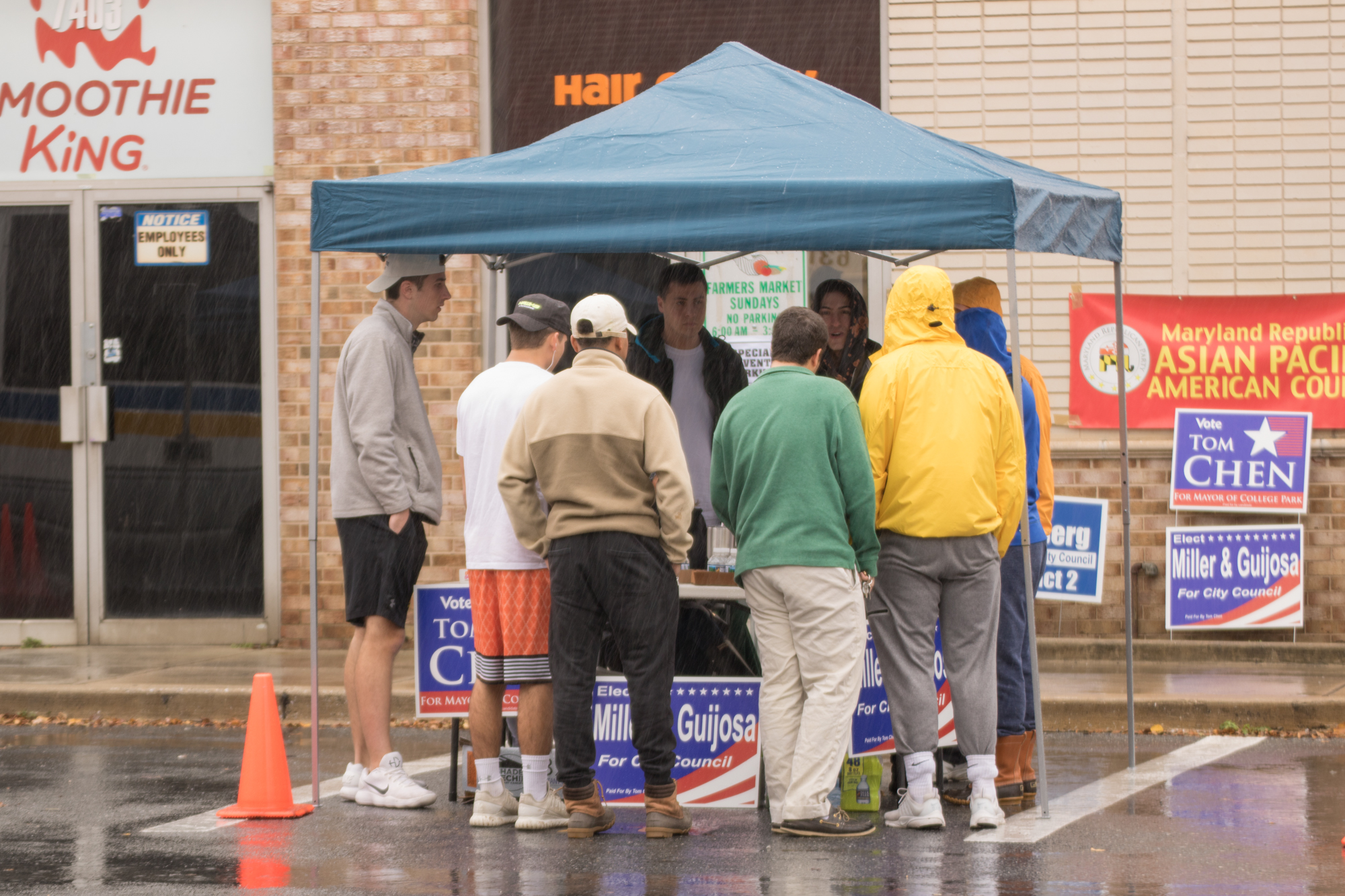After the most contested mayoral election in College Park history, residents and University of Maryland students expressed mixed reactions about the results.
Mayor Patrick Wojahn was re-elected, defeating District 4 Councilwoman Mary Cook, District 3 resident Tom Chen and District 4 resident Zari Malsawma. Wojahn received 1,568 of 2,648 votes.
Wojahn — whose campaign centered on issues including transportation, sustainability, downtown city development and challenges in diversity — was a District 1 councilman for eight years before he was elected mayor in 2015. He established the Neighborhood Stabilization and Quality of Life Workgroup and founded College Park Day in 2010.
[Read more: College Park Mayor Patrick Wojahn wins re-election]
Christina Toy, a four-year District 1 resident, voted for Wojahn on Tuesday and said she was excited about the results. In the next two years, she hopes to see finalized funding for the Hollywood Streetscape project, the completion of Duvall Field’s second phase and ground broken on the Hollywood Gateway Park project, as well as for the city to get its own police force.
“Security is an issue, especially in North College Park, because most of [Prince George’s] County police are in downtown College Park and rarely patrol, especially in my neighborhood,” Toy said.
Student Government Association parliamentarian Reid Buskirk said he is looking forward to Wojahn’s continued work in building a coalition between students and College Park residents.
[Read more: All the College Park City Council’s incumbent candidates were re-elected]
“Wojahn has it right when he says the citizens of College Park and the citizens of the University of Maryland have to work together,” said Buskirk, a freshman government and politics major. “There are a lot of disputes because they want two completely different things.”
Bridging the gap between residents and students was one of the main priorities for Chen, who said students are “treat[ed] very unfairly by the city and this community.” As a landlord for 22 years, Chen said the city treats students “like an ATM machine [giving] ticket after ticket [for] small, stupid” code violations.
Chen has at least 71 violations against the five city properties he confirmed he owns and has been repeatedly involved in legal disputes with the city.
Nina Patel, a District 3 resident, said she always votes, but this year she wanted to keep college kids off the ballot.
“We don’t need irresponsible slumlords running our city council,” Patel said. “He does not belong. He should actually be fined for his infractions and reprimanded for irresponsible behavior he obviously promotes.”
Andrew Malacrea, a junior civil engineering major, said most of his Phi Gamma Delta fraternity brothers voted for Chen because of his desire to reduce code violations, which he views as extremely stringent, he said.
“He seemed to promise a lot of things that would be appealing to people who live in Old Town and that happens to be a lot of Greek life people,” he said.
At first, Malacrea said he was surprised by the election’s results, but said “the more I think about it, it makes sense.”
“[Chen’s] key demographic is pretty much Greek life people and Old Town people and … there isn’t that many of us,” he said. “We’re all lazy and didn’t go out to vote, like myself, and so I think the more you think about it, even though he had support from a lot of people, those people just didn’t vote.”
Chen ran alongside District 3 candidates and students Zack Miller and Cindy Guijosa, who both lost to Councilman Robert Day and resident John Rigg. All five incumbent council candidates were re-elected to their district seats.
Freshman family science major Nick Warnick didn’t vote in the election due to time constraints, but said he had wanted to vote for Zack Miller.
“I like that [Miller] is a student that goes to University of Maryland, which is really cool because he can get the input of students,” Warnick said. “l also like how he prioritized public safety and how he wanted to improve pedestrian crossings on Route 1. I was shocked when that student was hit by a car and killed on Route 1 a month ago, so that priority is really important to me.”
Warnick said he is disappointed that Miller didn’t win the District 3 election and that he “was kind of shocked by the difference in votes between candidates.”
Mike Garceau, a District 3 resident, said he came out because he was unimpressed with the district’s student candidates Zack Miller and Cindy Guijosa.
“I wanted to make sure that as somebody who owns a home and has put significant amount of money into my neighborhood, that the people who were going to represent my interests would be elected,” he said.
Garceau added that he voted for Wojahn in the mayoral race because he’s done a good job of balancing the interests of both student and non-student residents.
“He’s been pretty good as far as trying to leverage the value of the university as well as the non-university components of the community,” he said. “It’s hard.”
Adele Ellis, a resident of Calvert Hills, said “the correct people won” the election, adding that she doesn’t think students should be on the council.
“I don’t see how someone who is only here for nine months a year for four years should have an equal voice as [residents], some of whom have their life savings invested in their house and whose quality of life and schools and those issues,” Ellis said. “That’s not equal. That’s simply not an equal interest.”
Students should have some say in what goes on in the city, Ellis said, and she is glad that there is a non-voting student representative for the council.
Moving forward, Ellis said she wants to see the government have a continued emphasis on public safety.
“That is something that students and residents share and are concerned about,” Ellis said.



